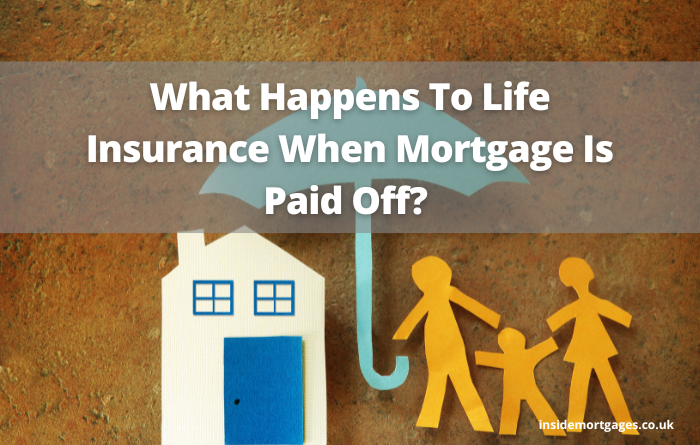What Happens To Life Insurance When Mortgage Is Paid Off?
Wondering what happens to life insurance when mortgage is paid off? When you pay off your mortgage, your life insurance policy will not be affected. The coverage and benefits of your policy will remain the same, and you will still be required to pay premiums until you wish you cancel or amend your policy.
You may however decide that the milestone of paying off your mortgage is a good reason to cancel your life insurance. This could be the case if you no longer need the security of the death benefit payment from the insurer, but this will entirely depend on your circumstances and needs as the policy holder, and should be discussed with your insurance provider and financial advisor.
Link Between Mortgages And Life Insurance
A mortgage is a large loan that helps individuals to finance the purchase of a property. Sometimes the lender will require the borrower to take out a life insurance policy as part of the loan agreement to cover the outstanding debt in the event of their death.
In other scenarios, individuals with joint mortgages who are equally responsible for paying the full amount of the outstanding debt on the mortgage may choose to take out a life insurance policy. The purpose of the policy in this instance would be to cover the balance on the mortgage if one of the borrowers dies before the loan is repaid in full and would mean that when named as a beneficiary on the policy, the surviving mortgage holder isn’t saddled with a large debt that they can’t afford to pay on their own.
What Is Life Insurance?
Life insurance is a contract between an individual and an insurance company. The policyholder agrees to pay regular premiums, and in exchange, the insurer agrees to provide a death benefit to the policyholder’s beneficiaries in the event of their death. The death benefit is generally used to cover final expenses such as funeral costs, and large outstanding debts like mortgages.
Who Needs Life Insurance?
Most people who have debt and/or dependents should have life insurance. If you are the primary breadwinner for your family and would leave them in a difficult financial situation if you were to die, then you should consider life insurance. If you have any debts, such as a mortgage, car loan, or student loan, then life insurance can help ensure that these debts are paid off in the event of your death.
How Much Life Insurance Do I Need?

Purchasing life insurance is one of the most important things you can do to protect your family in the event of your death. The amount of insurance cover that you need will depend on a variety of factors, including your income, the number of people who depend on you financially, your debt load, and your financial goals.
Generally speaking, you should purchase a life insurance policy that is worth at least five to seven times your annual income. So if you earn £50,000 per year, you should have a life insurance policy worth at least £250,000. If you have young children or other dependents, you may need even more coverage.
Your debt load is also an important factor to consider when determining how much life insurance to purchase. If you have a mortgage or other major debts, your family will need enough life insurance to pay off those debts in the event of your death.
Finally, think about your financial goals. Do you want to leave money for your children’s education? Do you want to make sure your spouse is taken care of financially if you die unexpectedly? Answering these questions will help you decide how much life insurance to buy.
Choosing When To Cancel Life Insurance
You can choose when to cancel your life insurance but this should be a decisions that is carefully considered.
As many people choose to take out life insurance as a financial guarantee that their mortgage payments and other large debts or financial obligations will be settled in the event of their death, you should ensure these needs are still met or no longer need to be met when canceling your insurance.
At the point that your mortgage has been paid off, you may reevaluate your cover needs and decide that you want to then cancel or reduce your life insurance coverage but before doing this, you should always speak to your insurance company in the first instance when wanting to make changes to your policy.
Should You Cancel Life Insurance After Mortgage Is Paid?
When a life insurance policy is designed to last for the length of your mortgage, and the death benefit is intended to pay off the balance of your loan in the event of your death. Once you’ve paid off your mortgage, do you still need life insurance?
The answer to this depends on your personal circumstances. If you have other debts or financial obligations that would need to be paid off in the event of your death, then you may still want to keep your life insurance policy in place after your mortgage is paid.
If however, you don’t have any other debts and your family would be able to financially survive without the death benefit from your life insurance policy, then you may decide to cancel the policy after completing your mortgage repayments.
There’s no right or wrong answer here – it’s simply a matter of figuring out what makes the most sense for you and your family.
Summary
We hope this article has covered the effects that paying off a mortgage has on life insurance policies.
To recap, paying off your mortgage has no bearing on your life insurance policy. The only way your life insurance will change is if you choose to amend it or cancel the policy with your insurance provider. You may decide to do this after finalising your mortgage payments but this is entirely your decision.
If you no longer need the death benefit paid from a life insurance policy to settle any outstanding debts after your mortgage is paid off, then this may be a good reason to cancel or amend your insurance policy. Whether or not to cancel life insurance after the mortgage is paid off therefore completely depends on your individual financial circumstances.
Whilst this article is intended to help you, it does not constitute financial advice and is not a substitute for personalised, professional advice. You should always consult a qualified professional before making any financial decisions.

